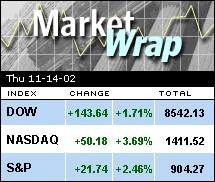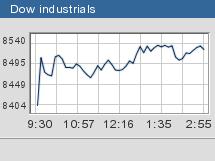NEW YORK (CNN/Money) -
U.S. stocks rallied Thursday, led by a strong surge for the Nasdaq and the broader market after key data on retail sales and jobs spurred investors to buy.
After the closing bell, Dell Computer (DELL: up $0.89 to $30.94, Research, Estimates) posted a third-quarter profit that rose 31 percent to 21 cents, meeting Wall Street estimates. Dell shares lost 87 cents to $30.07 in after-hours trading, giving up as much about as they gained in the regular trading session. Looking ahead, Dell said it expects fourth-quarter earnings to match estimates but indicated in a conference call that it could beat that estimate by a penny.
The Nasdaq composite (up 50.18 to 1411.52, Charts) gained more than 3.6 percent to close at a session high. The Dow Jones industrial average (up 143.64 to 8542.13, Charts) advanced 1.7 percent, while the Standard & Poor's 500 index (up 21.74 to 904.27, Charts) rose 2.4 percent.

Strength across the board in blue chips and technology stocks propped the Dow industrials and the Nasdaq, while a blockbuster merger in the financial services sector boosted the broader market.
Market breadth was positive. On the New York Stock Exchange, advancers beat decliners 11 to 5 as 1.4 billion shares traded. On the Nasdaq, advancers trounced decliners 3 to 1 as 1.7 billion shares changed hands.
The day's rally drew conflicting opinions from Wall Street watchers.
Phil Dow, market strategist with Dain Rauscher, was convinced that the market tone had shifted to the positive.
"Overall, I think there's been a profound change in sentiment after the market hit its five-year low in early October," Dow said. "The market is factoring in a possible resolution of the Iraq crisis. With the Republican victories in the midterm elections, there's a possibility of a tax cut for dividends. That's like a tectonic shift in fundamentals."
But some market pros cited this week's choppy trading trend and said investors are still "nervous" and "moody."
"Today is a one-piece news day, and we'll have several such days ahead as the market focuses on the economy in the absence of any other major indicators until December," John Pickett, New York Stock Exchange specialist with LaBranche & Co., told CNNfn'sMarket Call. " I wouldn't put too much emphasis on this rally because this market can still turn on a dime on any negative news. I think we'll be stuck in a trading range until then."
Considering that sentiment, investors will hope that Friday's key readings on consumer sentiment and October industrial production don't disappoint. The preliminary University of Michigan sentiment index for November is expected to rise to 82 from October's 80.6, while economists expect that production fell by 0.4 percent last month.
Household cheered, Honeywell nagged
A multibillion-dollar deal in the financial services sector between London-based HSBC and U.S. company Household International (HI: up $5.04 to $27.50, Research, Estimates) lifted the broader market. HSBC agreed to buy the leading U.S. consumer finance company for $14.2 billion in a move to boost its own presence in North America. At midday, however, AG Edwards and Wachovia downgraded the stock. Household International shares were the most active on the New York Stock Exchange.

Among the Dow winners, American Express (AXP: up $1.75 to $36.95, Research, Estimates) gained on the back on some dour news for rivals Visa and MasterCard. According to published reports, court documents showed that Visa and MasterCard were named in a 1996 class action suit by retailers, alleging that the credit card companies deliberately discouraged the use of rival debit cards to promote the use of their own more expensive versions. MasterCard declined comment on the matter.
IBM (IBM: up $1.37 to $80.72, Research, Estimates) shares rose after the company said in its analyst meeting Wednesday that it expected to return to earnings and revenue growth in 2003, largely due to gains in its market share. IBM, however, did not comment on its fourth-quarter guidance.
But a slump in Honeywell International (HON: down $2.09 to $23.16, Research, Estimates) tempered the Dow's gains. The company said in its Securities and Exchange Commission filing that a whopping $1.7 billion deficit in its pension plan could cut into its earnings at the end of the year. Salomon Smith Barney downgraded the stock to "underperform" from "in line," citing the larger-than-expected pension shortfall.
Semiconductor stocks and biotechs led the Nasdaq advancers. Intel (INTC: up $1.09 to $19.21, Research, Estimates) gained after the company introduced its fastest chip ever -- the Pentium 4 processor -- expected to enhance the performance of desktop personal computers. Separately, Intel said it added 480 million shares to its stock buyback target.
Biogen (BGEN: up $1.92 to $40.05, Research, Estimates) rose after the Food and Drug Administration approved a label change for its multiple sclerosis drug Avonex to show that it was a more effective treatment than the original label indicated.
Economy on the mend?
Retail sales for October came in flat, compared with forecasts for a 0.2 percent decline, showing a strong improvement from September's revised 1.3 percent drop. The news was greeted with investor delight, because this important indicator of consumer spending trends also precedes the crucial holiday retail season.
The data appeared to lend credence to remarks made Wednesday by Federal Reserve Chairman Alan Greenspan, who indicated that consumer spending would effectively lead the economy out of its current "soft patch."

Separately, the Labor Department reported that new weekly claims for unemployment benefits fell to 388,000 in the week ended Nov. 9 from a revised 396,000 the prior week. Economists, on average, expected 396,000 new claims, according to Briefing.com.
"These data reinforce the notion that, while consumption is going to be slower in the fourth quarter than in the third quarter, it doesn't look like the consumer is raising the white flag and giving up," said Joshua Feinman, chief economist with Deutsche Bank Asset Management.
European bourses ended higher, while Asian-Pacific stocks finished mostly lower Thursday, with Tokyo's Nikkei index hitting a fresh 19-year low.
Treasury prices fell, with the 10-year note yield rising to 4.04 percent. The dollar gained against the yen and euro.
Light crude oil futures rose 1 cent to $24.49 in U.S. trading. Gold traded lower.

|

